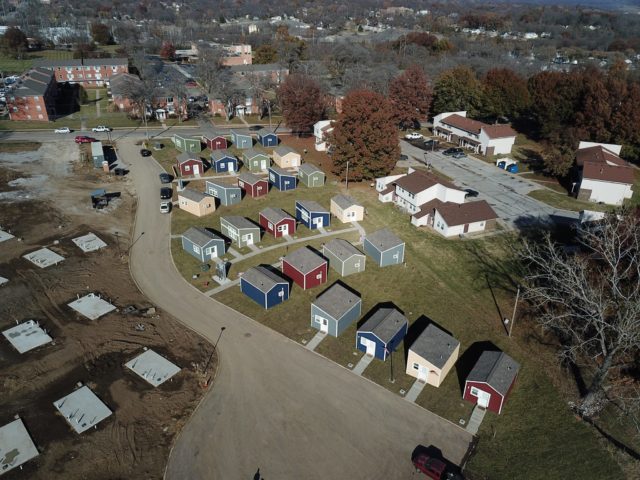
Longmont’s newest neighborhood is going to be a village within the city — a community of tiny homes for veterans who need a little stability in their lives. It will be a sanctuary for local veterans who need a home and who need support services.
The village is a crossover venture between the Kansas City-based Veterans Community Project (VCP), the City of Longmont and local Longmont developers. The initiative began in 2018, when the Longmont City Council passed a resolution supporting the “Mayor’s Challenge to End Homelessness.”
In the wake of that resolution, the city assembled a taskforce known as the “veteran’s housing coalition.” Councilwoman Bonnie Finley spearheaded the effort, appointing local developer Kevin Mulshine as head of the “land acquisition committee” and charged him with finding a place in Longmont to build veteran housing.
It was not as easy a task as it sounds.
“We met with some churches that were fantastic and some others [that were] willing to give some land,” Mulshine says. “But what happened each time was there was always an existing neighborhood.”
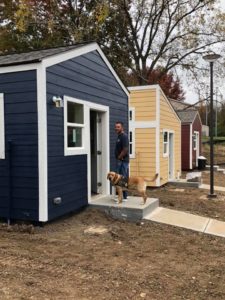
And when the City would propose building houses for homeless vets near those existing neighborhoods, they would be assailed with so many objections they’d be forced to concede and look elsewhere.
That’s when Councilwoman Finley put a little friendly pressure on Mulshine to include homeless veteran housing units in one of his new upcoming neighborhood developments.
“You can understand a developer’s apprehension of putting something for homeless vets on property where you want to sell new homes,” Mulshine says. “We finally got to the point where we said, ‘Look we’ll consider it but only if you can find a really amazing company to manage it that does a great job.’”
Thus began the search — a quest that would take Mulshine to California, Virginia, Florida and, eventually, Kansas City — looking for the right organization to house vets in Longmont.
And when Mulshine visited the tiny home village in Kansas City, he says he remembers how struck he was by the appeal of VCP’s housing system. “It’s vibrant and it’s a really special place where they create a really special environment,” he says. “It’s pretty incredible.”
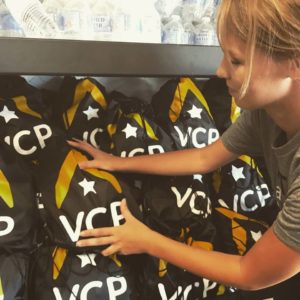
VCP is a vet-focused, privately funded nonprofit on a mission to end veteran homelessness around the U.S. In Kansas City, it offers housing and “wraparound” homelessness services to any person who has given the oath to serve this country, and the organization has been looking to expand into a second city.
So, when Mulshine showed up at the tiny home village for vets in Kansas City, it was a good match.
“We’ve had 600 other cities reach out to us and say, ‘Hey, we want you to do what you’re doing in Kansas City in our community,’” Mark Solomon, a Navy veteran and the co-founder of VCP says. “The reason we’re coming to Longmont as our first official expansion city is that we’ve got amazing community support. Not only from individuals and the community, but the city government itself, from the mayor to the city council people to the city staff, they are all totally bustin’ their humps to make sure that this goes smoothly and gets done quickly.”
The soon-to-be-built village will have the capacity to house 25 homeless veterans, and from the way Solomon and Mulshine describe it, it’s going to be a beautiful haven for those who end up living there.
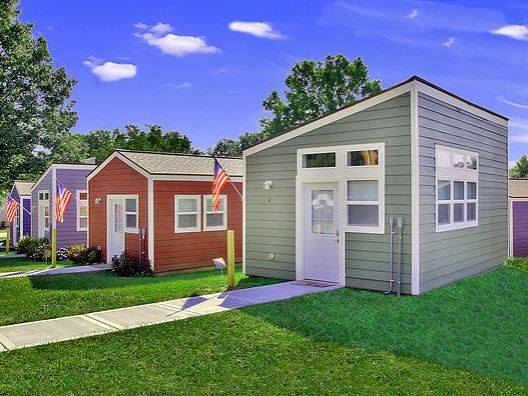
“We’re actually going to take what they did in Kansas City and make it a little nicer,” Mulshine says, explaining that they’ve already engaged with architects to improve upon the tiny homes’ aesthetic. “We just want to make something that looks really nice.”
The VCP village will be on the west side of town between Rogers and Nelson Roads by South Anderson Street. Each of the 25 tiny houses will be around 250 square feet, each unique and charming. Aesthetically, there may be some differences between Kansas City’s tiny home village and the one being built in Longmont, but functionally, they will be identical. This is where the power in VCP’s Kansas City model lies: the wraparound services provided to clients.
“In Kansas City we’ve helped over 8,000 veterans so far with various services including housing but not just limited to our houses,” Solomon says. VCP connects vets to existing homelessness services in the area, offering everything from psychological and medical services to career services to financial assistance, transportation, education and training.
VCP starts by assessing clients by their level of vulnerability, taking into consideration individual needs and then providing help to get vets back on their feet. It’s a comprehensive approach to getting these veterans into homes and keeping them off the streets, changing their lifestyles so they can live safer, healthier, happier lives.
“In the Kansas City village, we have a small food pantry and a small clothing center and so we can get our clients immediate stuff if they need after they’re triaged,” Solomon says. “Maybe they just need a place to stay for the weekend, before we get them into houses, and we can get them a hotel room if we need to. Or maybe their dog is sick and needs veterinary services, we’ll get their dog taken care of.”
Each veteran is assigned a case manager after they’re assessed, who works with the vets to establish goals and start making progress toward accomplishing them. Currently, VCP has about one case manager for every eight clients, and the group ultimately wants to shave that ratio down to 4-to-1, Solomon says.
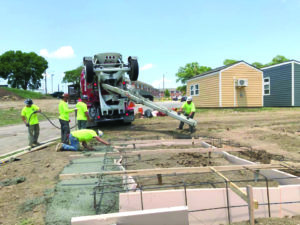
“To give you kind of an industry standard, most organizations will have about a 30- or 40-to-1 case manager workload,” he says. VCP clients get a lot of attention from their case managers, compared to standard homeless programs.
Through these wraparound services, VCP teaches clients necessary skills, like how to budget, cook, clean and grocery shop. Basic skills that people might not have needed after years of homelessness, Solomon says. “We have children in our Kansas City village, too,” he adds. Even pets are allowed in the VCP tiny homes.
“There are rules, though,” Solomon says. Rules like no drugs and alcohol, no partying, no weapons and no violence. “This is the kind of environment that we are trying to foster, it’s a safe environment for people to get better and get back on their feet.”
VCP has proved very successful in Kansas City. In part because the nonprofit is founded and managed by vets, like Solomon, but also because VCP is a privately funded organization, which allows it complete autonomy to help serve vets however it sees fit. It doesn’t have all the bureaucratic hoops and hurdles that government-sponsored homeless programs often have to deal with.
Solomon explains that in a traditional program vets are required to provide a lot of paperwork to prove their veteran status before they can access homelessness services. And even if they do have the proper paperwork, the verification process can mean days or weeks before they receive any kind of assistance.
That’s not the case with VCP.
“Once we can preview a vet, then they’re good to go. Right then we can get them to housing services and things they need. I don’t need to prove you’re a vet,” Solomon says. “I can just think you’re a vet and that’s good enough for me.”
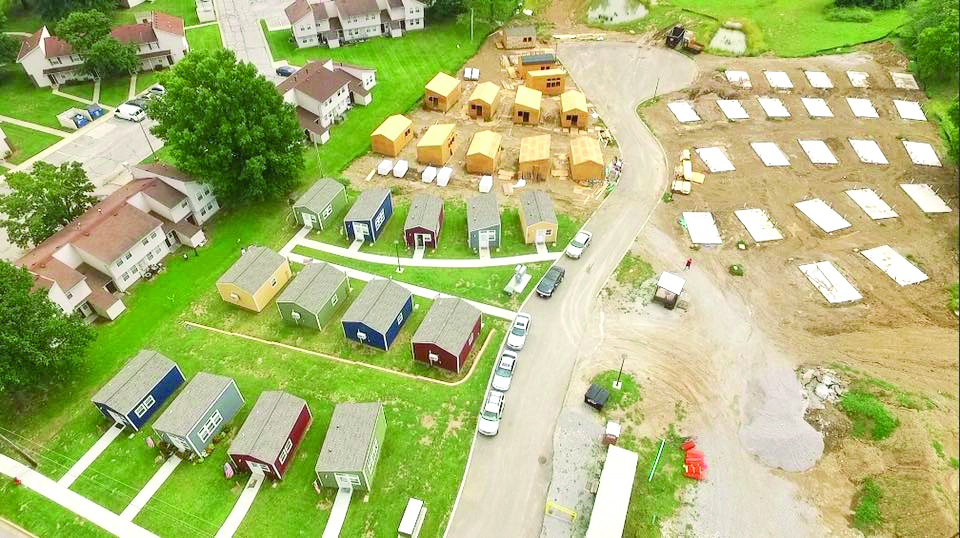
It’s an effective model, dedicated to making a difference in the lives of homeless veterans and addressing the root causes of their homelessness. And since the founders are all veterans themselves, there’s an authentic connection to the clients that many civilian-operated organizations can’t achieve. Solomon says this is another huge factor in their success.
The Longmont project is expected to break ground in August or September 2019, according to Mulshine. He says the city has expedited the process of building this tiny home village.
Veterans will also be able to access VCP services by the fall and shortly thereafter, Solomon says VCP plans on getting the first 25 vets moved into the Longmont VCP village.
“It’s transitional housing so they can stay up to two years,” Solomon explains. By the end of that two years, the hope is that VCP will have helped clients get their feet back underneath them, to find stability and maintain it. “Our whole goal is to help in whatever way that they need to be made whole again.”
Conveniently, Mulshine explains that they are also building out several lots adjacent to the VCP tiny homes village in Longmont for Habitat for Humanity. “One of the concepts is that might be a great place for some of these veterans to be able to transition into,” he says.
So far, both Mulshine and Solomon say that there has been immense community support for this project. Right now, though, Solomon says the biggest two things they need are volunteers and fundraising. Individuals who want to help in either of those regards need only access the VCP website, where both options are prominent.
For homeless vets in Longmont and Boulder County, VCP’s tiny home village is going to be a stroke of fortune. Not only is it going to be a nice place to live — a warm and tightknit community of vets supporting each other and being supported by VCP’s wraparound services — but it’s also going to serve as a platform from which homeless vets can regain an element of long-term stability in their lives.
All it’s going to take is a tiny village.














